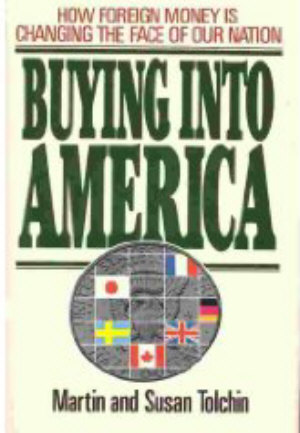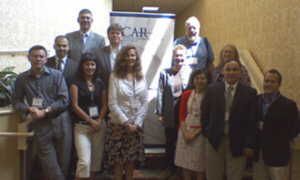www.mybaycity.com
December 18, 2008
(Prior Story) Business ArTicle 3363 (Next Story)
Sponsored by Bay Area Chamber of Commerce
Southern States Give Billions in Subsidies to Foreign Automakers
|
||||||||||
| Printer Friendly Story View |

Book documents how America has been transformed by foreign investment since the 1980s.

BuyUSA.gov team that aims to increase exports of U.S. autos assembles in Traverse City, Michigan, in 2007.
Southern states have given billions in incentives to foreign automakers to locate plants there.
At the same time Southern legislators in Congress have consistently opposed aid to the Big Three, located primarily in the North.
Southerners like Sen. Jim DeMint, South Carolina Republican, argues: "We need to let the market and the laws work the way they are already in place."
But Southern states have not let the market work and have given heavy financial subsidies to foreign automakers.
Following is from the Institute for Southern Studies:
"Good Jobs First reports the total figure of $3.58 billion is low. For example, Alabama's give-away to Mercedes in 1993 -- when the state's school system was under court order for depriving students --was later estimated at around $500 million once the cost of job training, land and other perks are included.
"Democratic leaders in Georgia, Mississippi and North Carolina have been no stranger to the give-away game, as James C. Cobb's excellent history 'The Selling of the South' describes in rich detail.
"But it does bring into question Sen. Shelby of Alabama's claim that 'I do not support using taxpayer dollars to save private companies.' Maybe he meant to add, "Unless they're in Alabama."
One writer calls Southern subsidies to foreign automakers "corporate socialism."
But a big question remains: Will this Southern strategy persist in the long run?
"There's plenty of debate as to whether the taxpayer funded 'corporate welfare' incentives are worthwhile in states that consistently rank last in poverty, education and health care," comments a Southern Studies report entitled "Foreign Automaker Investments in the South Bring Prosperity -- For Now."
Huge incentives given BMW by South Carolina created a fiscal crisis in the state. Minimal levels of corporate taxation were causing the state's schools to fall into greater disrepair and educational achievement was low. Other government services such as highway maintenance and public safety also were underfunded, leading to tax increases for families.
"The foreign companies that come in here don't care that the schools are terrible," one philanthropist told a reporter. "They just want the cheap labor. And the incentives are so extraordinary."
The drive for cheap labor leads to a "race to the bottom" that reverses all the gains won by the UAW on behalf of workers in the North.
AFL-CIO sources says Toyota is "disappearing" workers in order to replace long time workers with permatemps with much lower wages and largely without health benefits.
The nonunion company reportedly is firing employees who are injured at work. In addition, full-time workers are being replaced with temporary workers who are paid half what regular team members earn and have little or no health insurance, workers say.
Says one worker:
"Shoulders would wear out, wrists would require surgery and back and hands started to fail. It seemed as if the good people who contributed to the success of Toyota were being used up and disposed of like garbage."
In Kentucky, auto workers reportedly earn an average of $12 an hour, half that of other manufacturing jobs.
The Southern Strategy was outlined in a presentation "Drive to Move South: The Growing Role of the Automobile Industry in the South," by Sujit M. CanagaRetna, Senior Fiscal Analyst Southern Legislative Conference before the 54th Annual Tennessee Governor's Conference on Economic and Community Development, Nashville, Tennessee September 13, 2007.
Mr. CanagaRetna wrote: "Southern states offer incentive packages including tax breaks, worker training programs, an abundant labor pool and the ability to train a workforce that has not worked in the auto industry previously.
"Other general features such as the weather, reduced cost of living, lower or no personal income taxes, free or inexpensive property costs to build assembly plants, along with other attractive quality of life attributes, make these Southern locations very compelling.
"While the domestic auto industry remains embroiled in a structural conversion that has resulted in layoffs for thousands, drooping sales figures and rising financial losses, several foreign automakers operate very successfully in numerous Southern locations.
"A number of distinct advantages, both financial and non-financial, contained in these Southern states lured these foreign automakers in the last two decades or so, a move that has completely shifted the economic orientation of these Southern locales from largely agricultural to high-tech, manufacturing economies.
"These foreign automakers and the cascade of auto parts suppliers and related activities that have set up operations in their wake remain a dominant feature of the new South's economic landscape.
"In addition to contributing significantly to the states' gross product, these auto plants and parts suppliers provide employment to tens of thousands, generate billions in diverse forms of revenue and create myriad other benefits.
"A number of economic studies conducted on the overall impact of the industry clearly demonstrate that their significant positive effects far exceed the economic incentive packages provided by the states."
Meanwhile, the U.S. Department of Commerce and the Center for Automotive Research (CAR) in Ann Arbor, Michigan, in 2007 began a campaign to even the playing field by increasing auto exports. A U.S. Commercial Service Global Automotive Team has been assembled. Information is available at BuyUSA.gov.
The history of the foreign automakers in the U.S. began in 1978 when Volkswagen opened a plant in Pennsylvania. That venture, which fell victim to labor unrest, ended in 1988.
The real invasion began in the early 1980s, at a time when Japanese producers were steadily increasing their share of the U.S. car market. The Japanese decided to open production facilities in the U.S. even as Congress was considering legislation mandating domestic content for cars sold in the U.S. market.
Honda Accords were assembled in Ohio beginning in 1982.
Nissan, which started producing trucks at its Smyrna, Tennessee plant in 1983, expanded to automobiles two years later.
Toyota got involved in both a joint venture with General Motors in California and an operation of its own in Kentucky.
Mazda announced plans in 1984 to build an assembly plant in Michigan.
Illinois provided Mitsubishi a package worth $249 million, the biggest in Illinois history and then the biggest package ever given an auto assembly plant in the U.S.
Authors Martin and Susan Tolchin noted in their book Buying Into America: "There was nothing secret about these strategies: The Japanese encouraged their companies to invest abroad as enlightened policy, designed to stave off protectionism and save jobs."
Publishers Weekly commented: "This in-depth report concludes that foreign investment is eroding America's control of its destiny."
The book notes that the U.S. was transformed in four years (1982-86) from the world's largest creditor nation to the largest debtor.
"While reciprocal American investment abroad is almost totally barred," note the authors, "foreign interests have acquired increasing power to influence the U.S. public and affect government policy.
"America has been selling off the family jewels to finance the Federal deficit," charges a Congressman.
By the 1990s the threat of protectionism had passed, yet foreign automakers continued to expand in the U.S. to bolster market share and to take advantage of what had become relatively inexpensive U.S. labor.
Companies began to shift their focus from the Midwest to "right to work" states in the South. Nonetheless, state and local governments continued to offer lucrative subsidy packages, including:
In 1992 South Carolina offered BMW a package worth an estimated $150 million. A decade later, the state put up an additional $80 million in infrastructure aid when BMW decided to expand operations.
In 1993 Alabama lured a Mercedes-Benz facility, the first foreign auto plant in the state, with a package worth $258 million.
In 1999 Alabama landed a 1.7 million square foot $400 million Honda plant with a $158 million subsidy. A 2002 expansion won an additional package worth $90 million, including $33 million in tax breaks over 20 years.
Mississippi in 2000 lured a $950 million Nissan plant with a $295 million subsidy. Expansion of the project brought an increase in the subsidy package to $363 million.
A $1 billion Hyundai plant in 2002 was won by Alabama with a package worth $252 million.
Martin Tolchin, 80, former New York Times Washington bureau chief and founder of The Hill magazine, and his wife, Susan, a George Mason University professor, also wrote "Dismantling America: The Rush to Deregulate" in 1983 predicting dire consequences for policy changes that have undermined our economy.
COMMENT: The fact that warnings like those of the Tolchins have been totally ignored by our policy makers is evident in the economic collapse we are currently experiencing.
Foreign ownership also places the nation at risk in terms of national security. If war materials were needed, would we have to negotiate with former enemies Germany, Japan and Korea to build the tanks, planes and guns to defend ourselves?
Obviously, the Obama Administration will have to tackle the tough changes that need to be made to right the ship and return America to economic self determination.###
| Printer Friendly Story View |
|
|

Dave Rogers |
|
|
|
Printer-Friendly Story View
0200 Nd: 04-22-2024 d 4 cpr 0
12/31/2020 P3v3-0200-Ad.cfm
SPONSORED LINKS
12/31/2020 drop ads P3v3-0200-Ad.cfm


